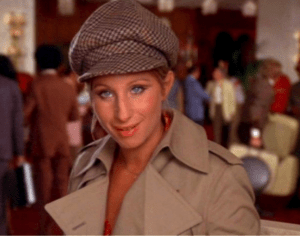Unlearning Silence in What’s Up, Doc?
I have a confession to make: I am terrible at taking up space.
For all that I am the outspoken, proud nerd in my school life, for all that I try to speak up for my views and ask questions in academic settings, for all that I am confidently liberal in conservative settings— I am distinctly self-conscious about all of it. For example, I don’t hesitate to call people out on their prejudice in history class, but the instant I stop speaking, I feel a wave of embarrassment as people register what I’ve said, which usually confirms my standpoint as a “liberal feminist killjoy.” On public transport, I make myself as small as possible. I go out of my way to avoid asking for favors. Like anyone else, I take up physical and intellectual space, but I am usually very nervous about doing so.
I hate it when people dislike me, and it’s a well-established fact that many, many people do not like women who try to claim space for themselves (as opposed to sharing space with a man as an accessory). Society as a whole is not enthusiastic about the idea of females occupying space— an issue that’s further compounded for women of color, or LGBTQ-identifying women. As Meredith Graves, the lead singer of the punk-feminist band Perfect Pussy, put it, “We’re taught from birth to erase ourselves… there’s all this language that wants women to not be visible.” For a woman to take up space and to be proud of it? Unheard of.
This is why, when I saw the movie What’s Up, Doc? for the first time, I fell completely in love with it. Aside from the fact that it’s ridiculously funny (it includes one of the longest car-chase scenes in the history of cinema), Doc stars the inimitable Barbara Streisand as Judy Maxwell, a viciously smart, if accident-prone, woman who is more than happy to take up space at all times. Over the course of the film, Judy causes several traffic accidents, hits an FBI agent over the head with an exotic sculpture, rattles off definitions of words like “decorum”, elaborates on classes of igneous rocks, and covers for her spectacularly head-in-the-clouds partner in crime (and love interest), Howard Bannister. In every scene, she wrenches the focus from Howard onto herself. She is absolutely fearless when it comes to getting what she wants.
For much of the movie, Judy’s main goal is to get Howard to ditch his stodgy fiancee, Eunice, for her. Now, this is not the most honorable or feminist motive for a female protagonist— Doc would certainly not pass the Bechdel test. I forgive Judy for this overly traditional focus because of the way she goes about realizing this— she is assertive and up-front, and fearlessly takes over various situations to achieve her ultimate goal. Take the scene in which she pretends to be Eunice at a dinner that Howard is attending. As Judy charms the dinner’s host and bowls her seat mates over with her incredible knowledge of Emerson, it becomes clear that the attention has shifted to her, with Howard becoming an afterthought to the scene. His bewilderment contrasts with Judy’s serious intellect to foreshadow their future partnership— one that is not just equal, but in which Judy calls the shots. Keep in mind that Doc came out in the 1970’s, when the idea of women being independent from men was just beginning to get traction. At this time, perhaps a woman could make some of her own decisions, but for her to decide things for a man would have sounded crazy to many. Additionally, that a female protagonist from this era can be both autonomous in her decisions and happy with her unattached status is amazing to me. As time has passed, it’s become somewhat easier for women to not require male validation of their actions and thoughts (for example, husbands no longer have to sign off on their wives’ birth control), but the societal pressures on women--even today-- that tell us that we need to have approval from men are still quite strong. I struggle with this often in 2016, so I can only imagine what Judy would have dealt with.
Judy is smart— to the point at which she intimidates others— and incredibly forward with her plans, which makes her a few enemies throughout the movie. However, the more common reaction to her from other characters is pure puzzlement as they try to decipher this wacky, frighteningly intelligent woman. Howard is also in this camp, but Judy doesn’t seem to care. She is aware of her weirdness and revels in it, perhaps appreciating the odd sort of power that it gives her. This is the thing I admire most about Judy: she takes up space and doesn’t care what other people think of her.
I care about what other people think of me. A lot. And these days, I’ve been shrinking myself in order to have others’ approval. I profess to be like Judy every day, but I sure could use a little more of her insouciance in my life. Then again, I don’t think that it would be a good idea to imitate Judy Maxwell in a literal sense— driving cars into the San Francisco Bay and getting in scuffles with the FBI isn’t appealing to me, nor is it very likely to happen. It’s also possible that the movie is especially ridiculous in hopes of distracting from Judy’s confidence-- or is meant to make her independence and smarts seem less feasible by surrounding it with funny, far-fetched events. But it couldn’t hurt to channel her attitude the next time I’m insecure about making noise, raising my hand, or simply asking for something I want. While I recognize that What’s Up, Doc? is entirely fictional (what was the last headline you saw about a geologist stealing an ice-cream cart?), I believe that Judy’s incredible confidence can be a real thing. Women unabashedly taking up space does not have to be something you only see in the movies.
This piece was written as part of JWA’s Rising Voices Fellowship.








I think what gives Judy Maxwell her insouciance is that she's something of a narcissist if not a sociopath. She makes up BS right on the spot, and she lacks any sort of restraint. Afterall she tried to force Howard Bannister to buy her a radio at the gift store, and she did commit idenity fraud at the musicologist convention. She is so self-involved that she causes street accidents because other people are trying not to hit her. She steals other people's reserved hotel rooms, and eats roast beef sandwiches that are charged to her victims' room service. Think about it.
In reply to I think what gives Judy by Ernst Blofeld
Or "overthink about it". The movie is an ensemble cast of quirky characters, each committing crimes or breaking social norms of one sort or another as they pursue the four travel bags with the same fervor that Judy pursues Howard. This comedy is a two-hour live action version of a Warner Brothers cartoon with Streisand as Bugs Bunny (she even nibbles on a carrot). To say the character of Judy attempts to "force" Howard to buy a radio for her, or was committing identity theft when she shows up at the dinner pretending to be Eunice, is akin to saying Bugs was attempting murder when he tricked Elmer Fudd to walk off a cliff. The movie even ends with the final scene of the Bugs-Elmer cartoon "What's Up, Doc?" and Porky Pig busting through the drum and excusing us with "That's All Folks". I don't think it's intended as a lesson in pathological or antisocial behavior.